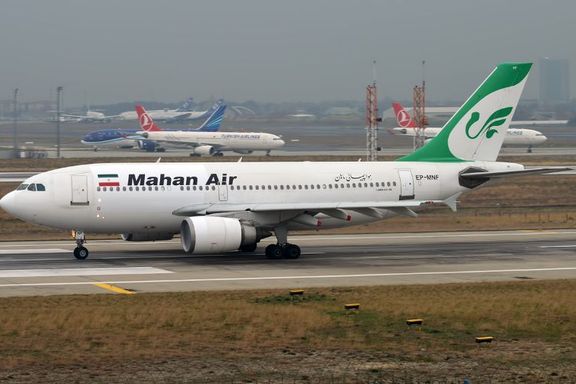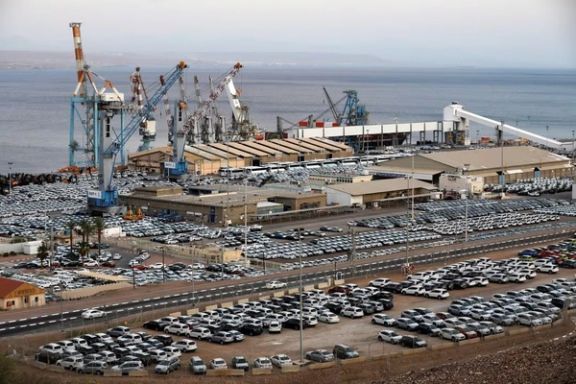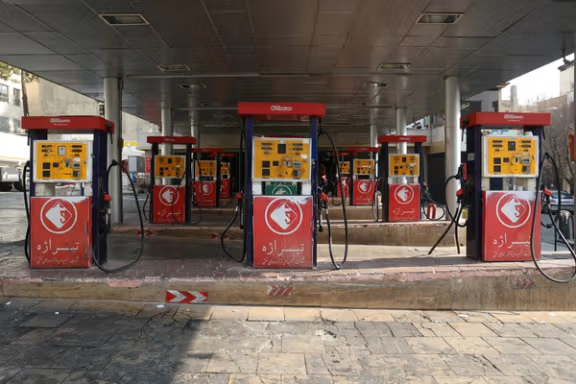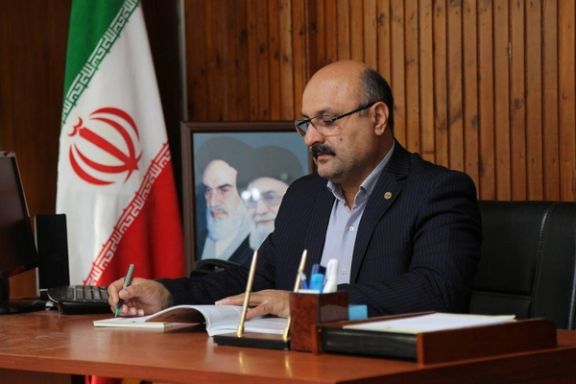South Africa Helps Iran Skirt US Aviation Embargoes

A global conflict tracker has revealed how South Africa helped Iran circumvent the United States’ sanctions on the Islamic Republic’s aviation industry.

A global conflict tracker has revealed how South Africa helped Iran circumvent the United States’ sanctions on the Islamic Republic’s aviation industry.
Aviation expert and author Babak Taghvaee from the Crisis Watch said on X that Iran’s MahanAir, affiliated with the Revolutionary Guards (IRGC), received two RJ85 passenger aircraft on Thursday.
“The aircraft are purchased by means of a South African and a Congo-based company and were just transferred to Iran by means of a stop in India,"he said, claiming that two more will be delivered Friday. He also shared aerial maps tracking the two aircraft -- TN-AKO and TN-AKP -- before reaching Chabahar port city in southeastern Iran.
According to an agreement between the Islamic Republic of Iran and the Taliban, the RJ85s purchased by Mahan Air, which were transferred from the Indian city of Hyderabad to Chabahar were later sent to Afghanistan, he claimed.
According to Taghvaee, “Every year in December, IRGC-affiliated companies and airlines, including Mahan Air, secretly transfer their illegally purchased aircraft and helicopters to Iran.” “So far, two of these RJ85s with sham Congolese registration codes have been flown to Iran,” he added.
Last December, four Airbus A340s aircraft departed South Africa for Uzbekistan but were diverted to Iran, with the country’s authorities announcing afterwards that they have purchased them.
Iran has suffered from shortages of civilian airliners since the 1990s and used a variety of ways to lease older planes or buy spare parts through intermediaries, but the technical state of its fleet has been deteriorating.
The 2015 nuclear agreement (JCPOA) suspended sanctions on purchases of Western aircraft and Iran began talks to buy new planes from Boeing and Airbus. A few Airbus planes were delivered but the Trump administration never approved the sale of US planes until Washington withdrew from the JCPOA in May 2018.

Iran-backed Iraqi militias launched a drone attack on the Israeli port city of Eilat, but the drone was intercepted by Jordan in its airspace.
The Islamic Resistance in Iraq, an umbrella term for multiple Iran’s proxies, claimed responsibility on X for the failed attack on Friday morning. In the statement, they claimed the drone had hit the target.
According to Hebrew-language daily newspaper Maariv, the Jordanian Defense Ministry announced that it had shot down the drone after it had crossed into Jordanian airspace
Islamic Resistance in Iraq said the attack is in support of the people of Gaza, who have been under heavy Israeli fire since October 7, when Tehran-backed Islamist militant group Hamas declared war on Israel, killing 1,200 mostly civilians and taking 240 hostages.
According to the Washington Institute for Near East Policy, the Islamic Resistance in Iraq (IRI) is not a fixed group "but rather a generic name used to denote unity among Iran-backed armed groups. The "generic, no-logo brand" militia is part of Iran's "facade strategy" to avoid accountability for attacks on Americans, which have been intensified by the Gaza crisis. The institute suggests that Iran's Revolutionary Guard Corps (IRGC) is likely coordinating the attacks and "corralling" Iran's proxies which would normally argue over public leadership.
The attack on Eilat is part of Iran's attempts to use proxy groups around the Middle East to put pressure on the US and Israel, as has been the case with increased Houthi attacks in the Red Sea. Israel's Eilat Port has seen an 85% drop in activity since Iran-backed Houthi militants in Yemen stepped up attacks on shipping in the Red Sea, the port's chief executive said on Thursday.
Also on Thursday, the US Central Command (CENTCOM) announced that Assad Air Base in Iraq’s western province of Anbar, hosting American forces, was targeted by Iran-backed proxy forces in Iraq, who have launched around 100 such attacks since October 7.

Iranian-American activists say the Chairman of the US Senate Foreign Relations Committee is refusing to advance a bill that codifies sanctions against Iran’s leaders.
The bipartisan Mahsa Amini Human rights and Security Accountability Act (MAHSA Act) passed the House of Representatives with overwhelming majority in September 2023, but has not yet been moved forward for a vote in the Senate.
“Senator Cardin’s office told us they won’t markup bipartisan human rights bill MAHSA Act HR589 that holds leaders of terror regime in Iran accountable for crimes against humanity & funding terrorists,” posted activist Nick Nikbakht on X Thursday. “Killing innocent civilians in Israel, Ukraine & Iran is not enough for Cardin!”
Senator Ben Cardin is a Democrat representing residents of Maryland, a state with a sizable Iranian community. In his long career in the Capitol (first as a Representative then a senator) he has led many legislations related to human rights in Iran. His office’s refusal to move forward the Mahsa Act has therefore baffled many.
“Why are you refusing to mark up a bill that holds the Islamic Republic of Iran’s leaders accountable for their human rights violations, and for supporting Hamas terrorists,” asked another Iranian-American activist on X.
The MAHSA Act is named after the 22-year old Kurdish-Iranian girl who was detained in Tehran for not covering her hair fully. She was beaten in custody and died in hospital on September 16, 2022. Her death sparked country-wide protests, better known as the Women Life Freedom movement, which challenged the regime and its religious authority like never before.
The bill passed the house a year after Mahsa Amini’s death (with 410 voting in favor and only 3 voting against). It requires the executive branch to impose applicable sanctions on Iran’s Supreme Leader Ali Khamenei, the Supreme Leader’s Office and his appointees, Iran’s president and cabinet officials, foundations and other entities affiliated with the Supreme Leader.
It also requires the President to report to Congress every year whether those officials should remain under existing sanctions, making it much harder to lift sanctions for the current and future administrations.
Iranian-American activists have been pushing for this bill to become law ever since it was introduced to the US House of Representatives in the wake of the 2022 protests in Iran. But the legislative road has not been as smooth as they had wished, since the Senate is controlled by Democrats, who seem to be reluctant to take up the bill.
The Democratic Party’s stance on Iran –put on display most visibly by the Biden administration– has been widely and strongly criticized by activists and Republican lawmakers who advocate a tougher approach, especially after the October 7 attacks on Israel by Hamas.
The Biden administration this year allowed $16 billion of frozen funds to be released to the Iranian regime, the largest chunk after the October 7 Hamas attack on Israel that Iran fully supported and praised.
They may not get their way after all. But it won't be for lack of trying.
“Rest assured, we Iranians won’t give up on this bill,” writes another activist, Samie Moazzami on X, addressing Senator Cardin directly. “Is this the legacy you want, to oppose Democrats values of democracy & human rights by NOT sanctioning Iran’s terror leaders?”

Amid ongoing human rights abuses and military aggression across the region, the US Special Envoy for Iran delivered a message expressing solidarity with the people of Iran on Yalda night.
The stand-in envoy, Abram Paley, said: "On this Yalda night, we want the people of Iran to know that the United States will continue to support your aspirations for a free and democratic future. We are confident that Iran will overcome this period of darkness, and that brighter days are ahead."
Matthew Miller, State Department Spokesman, also joined in marking Yalda night, saying: "On the longest night of the year, we join the people of Iran and the wider region in looking forward to brighter days ahead. Happy Yalda to all who celebrate."
Yalda night, an ancient Iranian celebration, marks the longest night of the year, observed from the last night of Autumn to the sunrise of the first Winter day in the northern hemisphere.
Celebrated in multiple countries, including Iran, Armenia, Tajikistan, and Afghanistan, traditions include reading Hafez poetry and enjoying pomegranates, watermelons, and assorted nuts.
The symbolic celebration underscores the victory of light over darkness. In Iran, where most are now living under the poverty line in the worst economic crisis in recent history, and oppression continues to deepen, many in Iran are feeling the country is in its darkest times.

A member of the Energy Committee of the Iranian Parliament claimed that the cyber attack on Iran's fuel supply system was carried out “from inside.”
Parviz Mohammadnezhad Ghazimahalleh said on Thursday that the the attack which cut off 70% of the country's petrol stations was a “physical” one. “They entered the system via a USB or a program from inside,” he added without specifying the identities of the people involved.
On Monday, the cyberattack which crippled gas stations across Iran was claimed by the hacking group "Gonjeshk-e-Darande" or Predatory Sparrow which announced the attack on X, claiming that they took out “a majority of the gas pumps throughout Iran.”
Iran accuses “Gonjeshk-e-Darande” of having links to Israel. The group rose to prominence as a hacktivist two years ago for a similar cyberattack on fuel distribution centers across Iran on the eve of the second anniversary of the bloody suppression of the November 2019 protests. In a separate incident, they claimed responsibility for hacking the state railway company.
It is the second time such an attack has taken place, Ghazimahalleh said, accusing the responsible officials of “negligence” and “carelessness.”

The remarks came a day after Hadi Beigi-Nezhad, another member of the Energy Commission of Iran’s parliament, said a cyber virus had infected the fuel system, attributing it to an individual and a network that had infiltrated the country.
Last year, “Gonjeshk-e-Darande” garnered attention for successfully penetrating the computer systems of major steel companies in Iran.
Tejarat News, an economic news website, announced on Thursday that the majority of gas stations in Tehran province have been reconnected to the online distribution system.
Out of a total of 330 gas stations in the province, 239 are now connected to the national fuel system, Tejarat News quoted a local official as saying.
Also on Thursday, Morteza Mahmoudvand, another Iranian lawmaker, blamed “Zionists” and Israel’s intelligence agency Mossad for the fuel system attack and urged “an equilibrium of fear” in order to fight what he called the country’s enemies.
Equilibrium of fear means doing to them what they do to us, added Mahmoudvand, who is a member of the National Security and Foreign Policy Commission of the Iranian parliament.
He claimed that Israel’s cyber operations against Iranian targets will go on even after the Gaza conflict. We need to prepare ourselves in digital, technological and virtual domains not to be vulnerable to future attacks, he went on to say.
This is while the Islamic Republic has already been involved in several cyber operations against Israeli targets.
Earlier in the month, Iran-linked hackers targeted a water facility in the rural area of County Mayo in Ireland, leaving the residents without water for two days.
The attack was carried out by pro-Iran Cyber Av3ngers group which wrote a message on the infected computer system and claimed that the facility was targeted because it used Unitronics Vision Series programmable logic controllers (PLCs), an Israeli-made piece of equipment.
In November, Microsoft’s Threat Analysis Center reported that the Islamic Republic has intensified its cyberattacks and influence operations since 2020, targeting the likes of Israel and Bahrain, one of the Persian Gulf states to make peace with Israel under the 2020 Abraham Accords, brokered by the US.

As Iran’s domestic carmakers lose money due to sanctions, a technological gap and mismanagement, officials are promising to boost the electrical vehicle production.
The only avenue open to Iran is to make deals with Chinese companies and start EV assembly, like fossil-fuel vehicles it produces.
China, dominating the global electric vehicle (EV) manufacturing landscape, holds the largest market share among the top five producers in 2023. Germany and the United States trail, while France and the UK see a rise in EV production. Collectively, these nations wield substantial influence on the global EV manufacturing scene.
The recent UN Climate Change Conference, COP 28, emphasized international efforts to combat climate change, with a focus on EV adoption and greenhouse gas reduction. Major EV brands like Tesla, Kia/Hyundai, and Mercedes spearhead the transition to battery power, while newcomers such as Rivian diversify the market, influencing its ongoing evolution.
In Iran, IKCO introduced the Tara EV, the country's inaugural all-electric vehicle, set for release in March 2024. Developed by IKCO's Jetco division, the Tara EV boasts a 45-kWh battery pack, providing a 300 km range on a full charge. Iran's Minister of Industry, Abbas Ali-Abadi, announced plans for three locally produced EV models by the first half of the upcoming Iranian year (beginning in March).

With ambitions for increased EV manufacturing and imports to meet rising demand, the government aims to deploy 100,000 electric taxis in key cities this year that suffer from chronic air pollution. Significant projects, including the launch of Oxygen, Iran's first all-electric car, and MAPNA group's plan for 20 EV charging stations nationwide.
However, Iran grapples with challenges within its auto sector, encapsulated by the term "Car Mafia." This network, alleged to thrive due to the state-owned auto sector's monopoly and inadequate government oversight, faces accusations of financial wrongdoing, evading US sanctions, and contributing to mismanagement. The "car mafia" obstructs the import of reasonably priced cars, manipulating the production of pricier, inferior local vehicles. This term encapsulates various issues within Iran's auto sector, including the impeachment of the industry minister and corruption allegations, portraying it as a formidable and dishonest force negatively impacting the auto industry and vehicle quality.
China’s Dominance in Iran Future EV Market
China's dominant position in the EV industry poses a significant challenge for Iran's plans, particularly concerning the production and processing of essential minerals like cobalt. The reliance on China raises doubts about the feasibility and affordability of Iran's comprehensive EV strategy, emphasizing the need to address China's hegemony over critical minerals for a reliable supply chain.
Global concerns emerge as China's control over vital minerals triggers reactions and export restrictions, impacting the global EV supply chain. The US responds with proposed regulations to limit tax breaks for EVs using minerals or batteries manufactured in China, reflecting the international repercussions of China's dominance in the EV sector.
Despite China and Iran's intentions to collaborate on EV manufacturing, Iran faces challenges in providing sufficient electricity for EV charging amid a natural gas crisis. The gas shortage would impede widespread EV adoption, necessitating steps to encourage renewable energy, which is substantially underdeveloped in Iran.
While automobile companies in Iran claim to be jointly producing electric cars with China, studies indicate that, in the current situation, most automobile companies in Iran are not profitable. Due to government meddling, Iran's state-owned automakers suffer significant losses of $3.7 million a day, or more than $1 billion annually. These automakers battle with demand while being huge businesses, which drives up prices. The issues are made worse by mismanagement, corruption. It will need quick action at the highest governmental levels to stop the car industry from collapsing and to find solutions to its problems.
Concerns about transparency arise in the Iran-China joint development of electric vehicles (EVs), especially considering the paucity of detailed information. This lack of openness raises the possibility that certain Iranian automakers, dubbed the "car mafia," might exploit the circumstances to import EVs rather than actively supporting home production.
The potential dominance of the Chinese in Iran's EV industry and the nation's reliance on vital minerals for battery manufacture underscore the serious flaws in the partnership. The success of Iran's EV plan depends on a clear roadmap, transparent implementation, and strict regulations to counter opportunistic activities in the automotive sector.
To advance a sustainable EV policy in Iran, a commitment to openness, robust regulation, and a shift towards renewable energy sources is essential. Immediate investments in EVs and addressing transportation industry challenges are crucial, emphasizing the need for a proactive and transparent approach to ensure the success of Iran's EV plan.